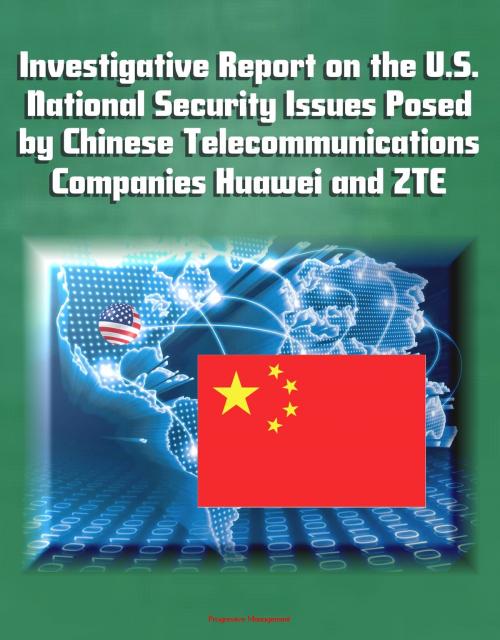Investigative Report on the U.S. National Security Issues Posed by Chinese Telecommunications Companies Huawei and ZTE
Nonfiction, Social & Cultural Studies, Political Science, Government, Communism & Socialism, International| Author: | Progressive Management | ISBN: | 9781301016549 |
| Publisher: | Progressive Management | Publication: | October 9, 2012 |
| Imprint: | Smashwords Edition | Language: | English |
| Author: | Progressive Management |
| ISBN: | 9781301016549 |
| Publisher: | Progressive Management |
| Publication: | October 9, 2012 |
| Imprint: | Smashwords Edition |
| Language: | English |
In February 2011, Huawei Technologies Company, the leading Chinese telecommunications equipment manufacturer, published an open letter to the U.S. Government denying security concerns with the company or its equipment, and requesting a full investigation into its corporate operations. Huawei apparently believed - correctly - that without a full investigation into its corporate activities, the United States could not trust its equipment and services in U.S. telecommunications networks.
The House Permanent Select Committee on Intelligence initiated this investigation in November 2011 to inquire into the counterintelligence and security threat posed by Chinese telecommunications companies doing business in the United States. A preliminary review highlighted the potential security threat posed by Chinese telecommunications companies with potential ties to the Chinese government or military. In particular, to the extent these companies are influenced by the state, or provide Chinese intelligence services access to telecommunication networks, the opportunity exists for further economic and foreign espionage by a foreign nation-state already known to be a major perpetrator of cyber espionage.
As many other countries show through their actions, the Committee believes the telecommunications sector plays a critical role in the safety and security of our nation, and is thus a target of foreign intelligence services. The Committee's formal investigation focused on Huawei and ZTE, the top two Chinese telecommunications equipment manufacturers, as they seek to market their equipment to U.S. telecommunications infrastructure. The Committee's main goal was to better understand the level of risk posed to the United States as these companies hope to expand in the United States. To evaluate the threat, the investigation involved two distinct yet connected parts: (1) a review of open-source information on the companies' histories, operations, financial information, and potential ties to the Chinese government or Chinese Communist Party; and (2) a review of classified information, including a review of programs and efforts of the U.S. Intelligence Community (IC) to ascertain whether the IC is appropriately prioritizing and resourced for supply chain risk evaluation.
Despite hours of interviews, extensive and repeated document requests, a review of open-source information, and an open hearing with witnesses from both companies, the Committee remains unsatisfied with the level of cooperation and candor provided by each company.
In February 2011, Huawei Technologies Company, the leading Chinese telecommunications equipment manufacturer, published an open letter to the U.S. Government denying security concerns with the company or its equipment, and requesting a full investigation into its corporate operations. Huawei apparently believed - correctly - that without a full investigation into its corporate activities, the United States could not trust its equipment and services in U.S. telecommunications networks.
The House Permanent Select Committee on Intelligence initiated this investigation in November 2011 to inquire into the counterintelligence and security threat posed by Chinese telecommunications companies doing business in the United States. A preliminary review highlighted the potential security threat posed by Chinese telecommunications companies with potential ties to the Chinese government or military. In particular, to the extent these companies are influenced by the state, or provide Chinese intelligence services access to telecommunication networks, the opportunity exists for further economic and foreign espionage by a foreign nation-state already known to be a major perpetrator of cyber espionage.
As many other countries show through their actions, the Committee believes the telecommunications sector plays a critical role in the safety and security of our nation, and is thus a target of foreign intelligence services. The Committee's formal investigation focused on Huawei and ZTE, the top two Chinese telecommunications equipment manufacturers, as they seek to market their equipment to U.S. telecommunications infrastructure. The Committee's main goal was to better understand the level of risk posed to the United States as these companies hope to expand in the United States. To evaluate the threat, the investigation involved two distinct yet connected parts: (1) a review of open-source information on the companies' histories, operations, financial information, and potential ties to the Chinese government or Chinese Communist Party; and (2) a review of classified information, including a review of programs and efforts of the U.S. Intelligence Community (IC) to ascertain whether the IC is appropriately prioritizing and resourced for supply chain risk evaluation.
Despite hours of interviews, extensive and repeated document requests, a review of open-source information, and an open hearing with witnesses from both companies, the Committee remains unsatisfied with the level of cooperation and candor provided by each company.















